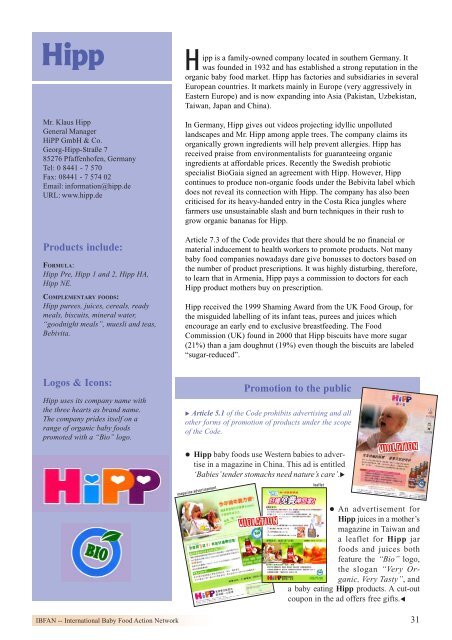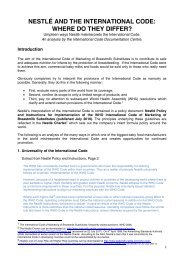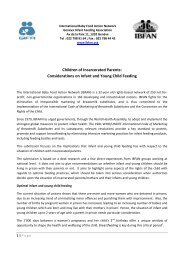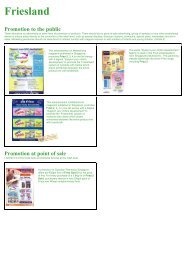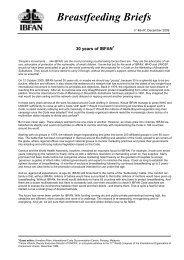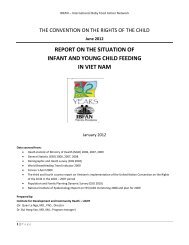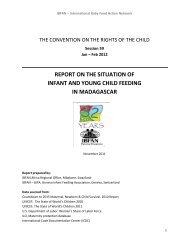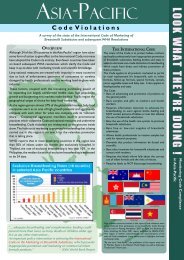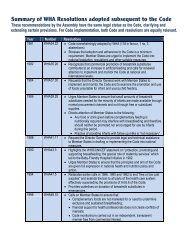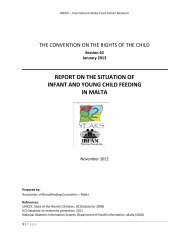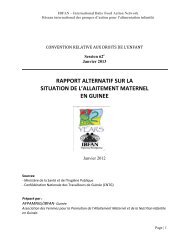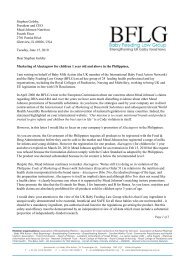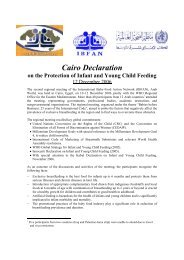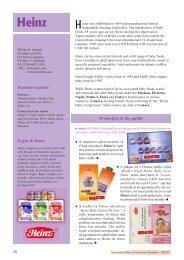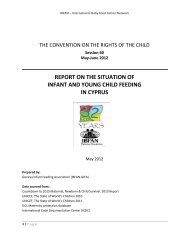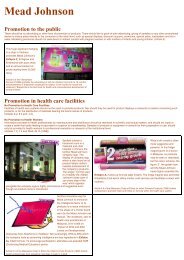Create successful ePaper yourself
Turn your PDF publications into a flip-book with our unique Google optimized e-Paper software.
Hipp H ipp is a family-owned company located in southern Germany. It<br />
was founded in 1932 and has established a strong reputation in the<br />
organic baby food market. Hipp has factories and subsidiaries in several<br />
European countries. It markets mainly in Europe (very aggressively in<br />
Eastern Europe) and is now expanding into Asia (Pakistan, Uzbekistan,<br />
Taiwan, Japan and China).<br />
Mr. Klaus Hipp<br />
General Manager<br />
HiPP GmbH & Co.<br />
Georg-Hipp-Straße 7<br />
85276 Pfaffenhofen, Germany<br />
Tel: 0 8441 - 7 570<br />
Fax: 08441 - 7 574 02<br />
Email: information@hipp.de<br />
URL: www.hipp.de<br />
Products include:<br />
FORMULA:<br />
Hipp Pre, Hipp 1 and 2, Hipp HA,<br />
Hipp NE.<br />
COMPLEMENTARY FOODS:<br />
Hipp purees, juices, cereals, ready<br />
meals, biscuits, mineral water,<br />
“goodnight meals”, muesli and teas,<br />
Bebivita.<br />
Logos & Icons:<br />
Hipp uses its company name with<br />
the three hearts as brand name.<br />
The company prides itself on a<br />
range of organic baby foods<br />
promoted with a “Bio” logo.<br />
<strong>IBFAN</strong> -- International Baby Food Action Network<br />
In Germany, Hipp gives out videos projecting idyllic unpolluted<br />
landscapes and Mr. Hipp among apple trees. The company claims its<br />
organically grown ingredients will help prevent allergies. Hipp has<br />
received praise from environmentalists for guaranteeing organic<br />
ingredients at affordable prices. Recently the Swedish probiotic<br />
specialist BioGaia signed an agreement with Hipp. However, Hipp<br />
continues to produce non-organic foods under the Bebivita label which<br />
does not reveal its connection with Hipp. The company has also been<br />
criticised for its heavy-handed entry in the Costa Rica jungles where<br />
farmers use unsustainable slash and burn techniques in their rush to<br />
grow organic bananas for Hipp.<br />
Article 7.3 of the Code provides that there should be no financial or<br />
material inducement to health workers to promote products. Not many<br />
baby food companies nowadays dare give bonusses to doctors based on<br />
the number of product prescriptions. It was highly disturbing, therefore,<br />
to learn that in Armenia, Hipp pays a commission to doctors for each<br />
Hipp product mothers buy on prescription.<br />
Hipp received the 1999 Shaming Award from the UK Food Group, for<br />
the misguided labelling of its infant teas, purees and juices which<br />
encourage an early end to exclusive breastfeeding. The Food<br />
Commission (UK) found in 2000 that Hipp biscuits have more sugar<br />
(21%) than a jam doughnut (19%) even though the biscuits are labeled<br />
“sugar-reduced”.<br />
Promotion to the public<br />
� Article 5.1 of the Code prohibits advertising and all<br />
other forms of promotion of products under the scope<br />
of the Code.<br />
� Hipp baby foods use Western babies to advertise<br />
in a magazine in China. This ad is entitled<br />
‘Babies’ tender stomachs need nature’s care’.�<br />
magazine advertisement<br />
leaflet<br />
� An advertisement for<br />
Hipp juices in a mother’s<br />
magazine in Taiwan and<br />
a leaflet for Hipp jar<br />
foods and juices both<br />
feature the “Bio” logo,<br />
the slogan “Very Organic,<br />
Very Tasty”, and<br />
a baby eating Hipp products. A cut-out<br />
coupon in the ad offers free gifts.�<br />
31


